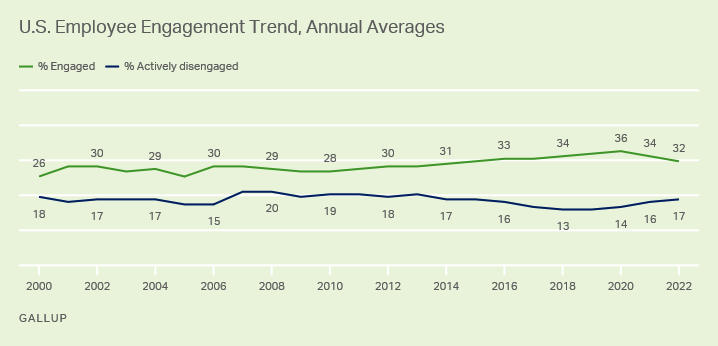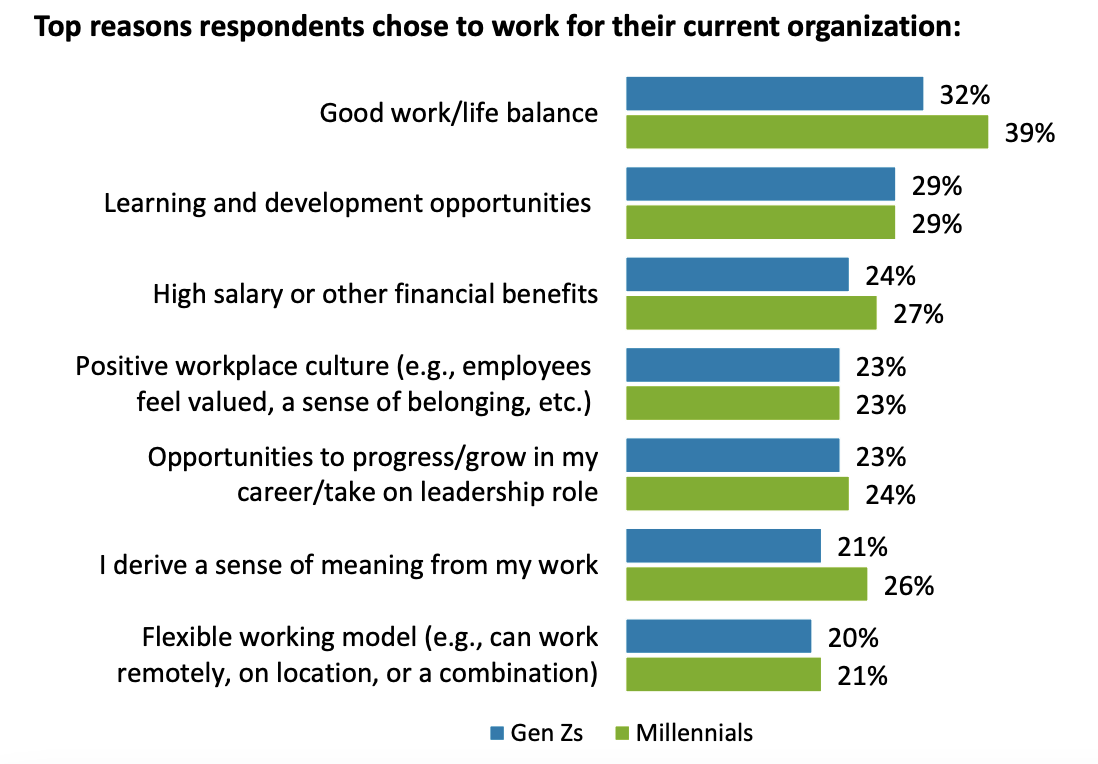The past couple of years has significantly affected employee productivity, motivation, and engagement rates.
Gallup's latest survey discovered that employee engagement is on the decline for the second year in a row, while the number of actively disengaged workers — the socially acceptable way of saying "utterly miserable at work" — has grown by 1%.

Admittedly, this isn't much of a shock. Between a worldwide pandemic, war, and a bleak economic outlook, it would be a much bigger surprise if people focused entirely on achieving better work performance.
After all, scientific research shows that stress reduces productivity and harms motivation, causing people to avoid cognitively demanding tasks.
So, if you're a business leader trying to guide their team to success, you might wonder: how can you keep your employees motivated during challenging times?
The good news is that there are plenty of strategies you can employ. These strategies will not only help your workers get through a difficult time but also help you build an organization resilient to life's inevitable hardships.
Work towards a meaningful goal
Many surveys have attempted to identify the exact factors that make people happy in the workplace. A study conducted by Gallup in 2021 discovered that:
- 64% of employees want better monetary compensation or benefits from their next job, signaling that people need to feel valued.
- 61% feel the ideal workplace will allow them a better work-life balance, revealing that something as simple as offering flexible employee hours could lead to more than just productivity benefits.
- 58% feel it's essential to do stimulating work they're naturally gifted at and trained to do, showing how important it is to recognize and nurture your employees' strengths. And;
- 53% think that job security is paramount, especially in 2023, when the world is dealing with a notable economic downturn.
But here's the thing: none of these factors matter unless your employees feel they're doing meaningful work.
Research has found that 9 out of 10 people would be willing to earn less money to do more meaningful work. And a research paper published in April 2021 discovered that job meaningfulness had a mediating effect on employee retention rates.
So, if you're looking for science-backed ways to keep your employees motivated and engaged during challenging times, the best thing you can do is set relevant goals.
And remember, purpose isn't only found in world-changing objectives. In fact, something as simple as providing coffee or cleaning the office can feel meaningful if the person doing the task knows they're working on something that's contributing to the team's results and is appreciated by their superiors.
Encourage growth, education, and passion projects
Another excellent way to motivate employees — even during stressful times — is to provide them with plenty of growth opportunities.
The Deloitte Global 2022 Gen Z and Millennial Survey found that:
- 29% of young workers chose to work for their current organization because it offered learning and development opportunities. And;
- 23% decided to accept a job because it came with the possibility of progress and growth.

The data from Deloitte's research reveals the motivational power of growth, education, and skill-building. Nonetheless, if you're willing to take a step further, add autonomy to the mix.
A scientific study from 2021 revealed that independence makes work feel meaningful, signalling that motivating your workforce, even during difficult times, could be as easy as allowing employees to spend some time on side projects.
This can be anything — from working on an industry-disrupting invention to redesigning their work desk. What matters is that they find satisfaction in the process and feel encouraged to pursue their passion, knowing that it will boost their creativity and recovery.
Create a safe environment
More often than not, keeping your employees motivated boils down to organizational culture.
If you're committed to leading a team with empathy, transparency, and healthy communication methods, you'll be capable of inspiring your team to push through both expected and unforeseen challenges.
After all, a safe environment where people can work with their ups and downs — not against them — is a more pleasant place to show up every day than a soul-crushing office where people don't feel like they belong.
Now, there are multiple ways to make your organization a psychologically safe environment that nurtures motivation instead of fear or disengagement. However, if you wish to go beyond the traditional methods of building such a workplace, consider making the following efforts a part of your job as a leader.
Encourage rest and time off
One of the most impactful ways you can help your employees stay motivated during stressful periods is to acknowledge that productive work only happens when there's enough time for recovery.
So, only allow your employees to try and push through what they can handle, as its only likely outcome will be burnout.
Worried about recruiter burnout? Check out our 5 tips to get through the Great Resignation
Instead, ensure that you highlight the importance of rest and recovery by encouraging team members to take a coffee break or an afternoon off. You might even call their attention to how a change of scenery might help them overcome a particular slump.
Moreover, ensure you've got a bulletproof leave management system to ensure your employees take sufficient time to recharge their batteries.
And don't hesitate to incorporate unconventional work strategies into your everyday routine. A recent pilot experiment has proven that embracing the four-day workweek helped 34% of organizations 'slightly' improve productivity, while 15% saw 'significant' efficacy boosts.
Practice transparency
One common side-effect of a team going through a stressful period is that people start to worry.
For instance, Forrester found that almost one-quarter of European employees feared for their job safety in 2021. And PWC discovered that as many as 39% of workers feel like they need more technological training from their employees, which could negatively affect their career path.
Although these specific fears may not necessarily be present within your team, it's still important to note that anxiety directly impacts motivation levels. Fortunately, you can easily avoid any negative consequences by practicing open and transparent communication.
Make sure your employees know what to expect, be honest about any difficulties they will face, and tell them how you plan to solve problems. In the end, knowing is always better than wondering (and worrying).
Want to learn more about pay transparency and how it affects the workplace?
Recognize success, have fun, and encourage healthy competition
In some (rare) cases, keeping your employees motivated during challenging times will require you to overhaul your leadership method completely.
However, maintaining motivation on a day-to-day basis is something you can easily do by injecting fun and a sense of accomplishment into your team's routine.
Something as simple as making sure to take the time to publicly acknowledge your employee's successes will give your team members the extrinsic motivational boost they need to continue doing exceptional work.
Or, if you feel that's not enough to inspire your workforce to go the extra mile, why not turn work into play? Having a friendly competition over who can achieve the best results or offering non-monetary incentives (like free lunch or a day off) can greatly motivate your employees.
Of course, don’t forget that monetary incentives work wonderfully as well when trying to keep your employees motivated, especially if you consider McKinsey’s latest data report, which shows that compensation is the most prominent reason for 61% of people staying at their jobs.
Finally, don't underestimate the power of fun team-building activities. Show your willingness to go above and beyond to make your employees feel like they belong in your organization. If you do so, you're bound to see a spike in everyone's motivation levels and improved productivity and collaboration.
Lead by example
Lastly, as you endeavor to use different strategies to motivate your employees during challenging times, remember that, as a leader, you must show your workers that you're prepared to lead by example. Show that you're just as human as they are and that you're employing the same tactics to maintain your motivation.
Final thoughts
Being a leader who inspires those around them is a challenging job. And, more often than not, it requires you to bring out the best in people even through the worst of times.
But then again, leadership is rewarding as well. The more you collaborate with your team members to accomplish common goals, the more satisfaction you will get from the process.
Does this mean it will always be smooth sailing? Absolutely not. But when you hit rough waters, you can come back to these strategies, boost your team's motivation, and ensure you're giving them the best chance of success.







